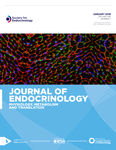Effect of mitotane on mouse ovarian follicle development and fertility
- Federica Innocenti,
- Lidia Cerquetti,
- Serena Pezzilli,
- Barbara Bucci,
- Vincenzo Toscano,
- Rita Canipari⇑ and
- Antonio Stigliano
- F Innocenti, DAHFMO, Unit of Histology and Medical Embryology, Sapienza University of Rome, Rome, Italy
- L Cerquetti, Endocrinology, Department of Clinical and Molecular Medicine, Sant'Andrea Hospital, Sapienza University of Rome, Rome, Italy
- S Pezzilli, Endocrinology, Department of Clinical and Molecular Medicine, Sant'Andrea Hospital, Sapienza University of Rome, Rome, Italy
- B Bucci, Research Center, S. Pietro Hospital, Rome, Italy
- V Toscano, Endocrinology, Department of Clinical and Molecular Medicine, Sant'Andrea Hospital, Sapienza University of Rome, Rome, Italy
- R Canipari, DAHFMO, Unit of Histology and Medical Embryology, Sapienza University of Rome, Rome, Italy
- A Stigliano, Endocrinology, Department of Clinical and Molecular Medicine, Sant'Andrea Hospital, Sapienza University of Rome, Rome, Italy
- Correspondence: Rita Canipari, Email: rita.canipari{at}uniroma1.it
Abstract
Mitotane (MTT) is an adrenolytic drug used in advanced and adjuvant treatment of adrenocortical carcinoma, in Cushing's disease and in ectopic syndrome. However, knowledge about its effects on the ovary is still scarce. The purpose of this study is to investigate the effect of MTT on the ovary using in vivo and in vitro models. The study was performed in CD1 mice and in the COV-434 human ovarian granulosa cell line. We examined ovarian morphology, follicle development, steroidogenesis and procreative function in mice and the effect of MTT on cell growth in vitro. Our results revealed that treatment of CD1 mice with MTT induces a decrease in early antral follicles with a subsequent increase in the secondary follicles, measured by the increased levels of Anti Mullerian Hormone (P<0.05) and decreased levels of FSH receptor (P<0.05). Moreover, we observed a significant decrease in Cyp11a (P<0.01) and Cyp17 (P<0.001) mRNA level, in MTT-treated animals. Ovulation, induced by PMSG/hCG stimulation, was also significantly impaired, with a reduction in the number of ovulated oocytes (P<0.01) and fewer corpora lutea in treated animals. Likewise, the mating experiment demonstrated a delay in the time of conception as well as fewer pups per litter in MTT-treated mice (P<0.05). Experiments performed on the COV-434 cell line, showed a significant inhibition of growth followed by apoptosis (P<0.01). In conclusion, our study highlights the key points of ovarian folliculogenesis affected by MTT and demonstrates impairment of the ovulation process with a negative impact on conception, which is nevertheless preserved.
- Received 28 December 2016
- Accepted 20 April 2017
- Accepted Preprint first posted online on 27 April 2017











